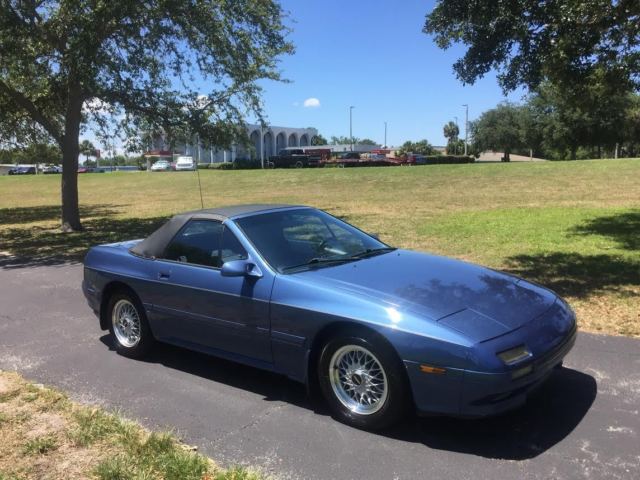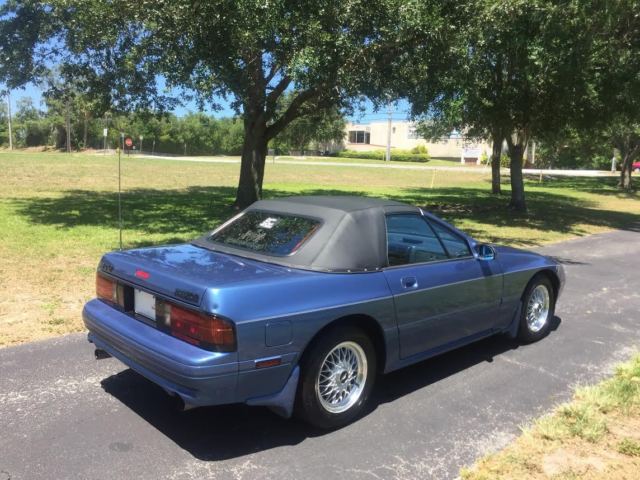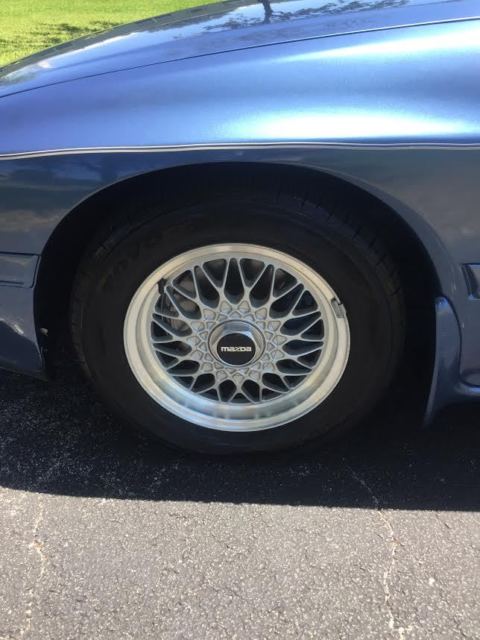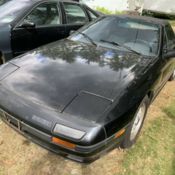1989 MAZDA RX 7 CONVERTIBLE - 76K VERIFIED MILEAGE - ROTARY ENGINE* NO RESERVE!!
1989 Mazda RX-7 COLLECTABLE
FANTASTIC CAR FOR DAILY DRIVING OR COLLECTORS RESTORATION - RARE CONVERTIBLE -ROTARY ENGINE - 76500 VERIFIED MILEAGE - GOOD CONDITION - FLORIDA CAR = NO RUST ISSUES- THIS IS A GARAGE KEPT VEHICLE - COSMETICALLY AND MECHANICALLY PERFECT CALL JR 321 872 4285 FOR MORE PHOTOS OR INFO - MAKE OFFER OR BUY NOWFuture Classic: Mazda RX7
Future Classics
byJason
The Mazda RX7 used to be a cult classic, however with the explosion of the Fast and Furious movie series it has become mainstream. Now hugely popular especially among the younger generations the quirky rotary powered sports car is sure to be a future classic.
Photo ByWill Vison
So what is it about the RX7 that makes it so popular? Let’s take a look.
Conception
The RX7 concept is simple, light weight, rear wheel drive, front engine all adds up to a classic sports car. Use of the Wankel Rotary Motor adds to the lightness of the car and the engine position which is just behind the front axle makes for great balance.
1st Gen
The first generation RX7 debuted in 1978. Known as the SA generation it would come with three engines over it’s life span, the 1.1L 12A, 1.1L 12A turbo, and the 13B which made 135hp and 135lb-ft of torque.
The car was very light weight by today’s standards at just 2500lbs. This meant that compared to other cars of it’s time it was quite a good handling machine and coupled with the 13B accelerated quite well. The 12A motor however with only 100hp made for a rather slow 0-60 of 9 seconds.
rotors of a wankel motor
Gen 2 RX7. The FC
by Grant c
Grant c
Starting in 1986 the second generation RX7 would become available with a naturally aspirated 13B producing 146hp. However in 1987 the turbo II model would come with the 182hp turbo.
Handling would be improved as gone was the old live axle of the SA and in was an independent rear suspension. This helped make the car easier to drive, and less prone to oversteer. The second generation would also see the addition of the automatically adjusting suspension which would adjust damping in response to camber angles. The car also got a bit softer as it was designed primarily for the US market where the previous generation had most of it’s sales. The Porsche 944 was a big influence on the design of the FC RX7 and that shows in the styling. While the car ended up being nearly 800lbs heavier then the first generation it still provides loads of driving pleasure and track ability.
Third Generation: FD
Oddly enough the third generation RX7 started it all. Follow me for a second here. For most of it’s life the RX7 was a bit of a cult classic reserved for the nerdiest of car nerds. For it’s quirky rotary engine, narrow focus, and relatively expensive price the RX7 would draw only a limited fan base. That is until the Fast and Furious was released.
Love it or hate the Fast and Furious launched a new generation of car guy and largely those car guys would be fans of Japanese cars and one in particular the third generation Mazda RX7. Playing one of the hero cars in the movie the Mazda RX7 showed what could be done in the aftermarket to what is already a very good sports car.
Photo by:The Pug Father
The third generation RX7 would be the most powerful to date with 252hp at debut and 276hp when production ended in 2002. It was also the first Japanese car to feature a twin turbo. (sequential turbo) The system was aimed at having the benefits of a turbo with none of the turbo lag and it worked wonderfully.
Generally regarded as one of the most well balanced cars of all time handling was as good as anything else one the road.
Several special editions of the RX7 were made through out it’s life span but few are sought after like the Spirit R.
Racing
Mazda has enjoyed it’s fair share of success in racing and some of that is due to the RX7. From Le Mans, to Group B rally racing the RX7 can be found everywhere in motorsports. Even today more then a decade after production ended RX7s are out at numerous track days, auto x, and even drag strips which is a true testament to not only the cars ability but it’s fan base.
Why it’s a future classic
Future classic is almost the wrong term here. The car is a classic now. Oddly enough over 800,000 RX7s were produced meaning the car is hardly rare. However as it’s aged and once production ended the RX7 became highly sought after and sometimes that is more important in making a car a collector car then production number. The RX7 has a rabid fan base of young car guys and gals and this ensures it’s collect ability going forward.
Right now some RX7 models are still pretty affordable. Of course conditions range from poor to show room new. It seems that the second generation is the easiest to find these days, especially if bargain hunting. The first generations production numbers were quite low making the car difficult to find in good shape, while the third generation is hugely popular these days because of it’s HUGE aftermarket and popularity.
So the combination of desirability, fun to drive characteristics, and uniqueness make the RX7 a future classic.
- Make: Mazda
- Model: RX-7
- SubModel: RX7
- Type: Convertible
- Trim: COLLECTABLE
- Year: 1989
- Mileage: 79,000
- VIN: jm1fc3510k0706019
- Color: BLUE
- Engine size: I.3 L ROTARY
- Number of cylinders: ROTARY
- Fuel: Gasoline
- Transmission: Automatic
- Drive type: RWD
- Interior color: BLACK
- Vehicle Title: Clear Want to buy? Contact seller!





















